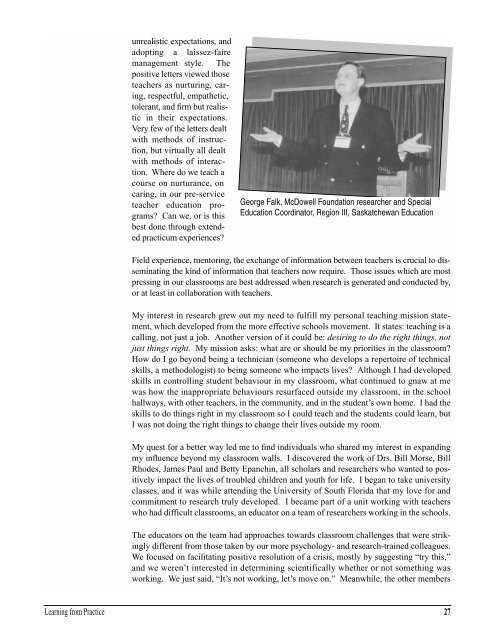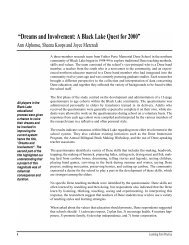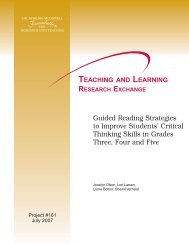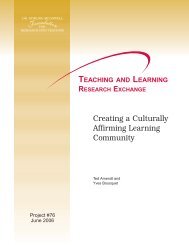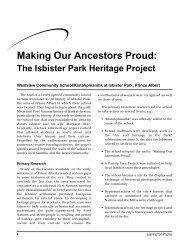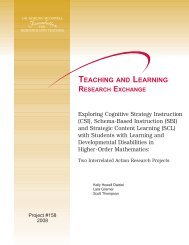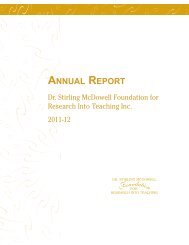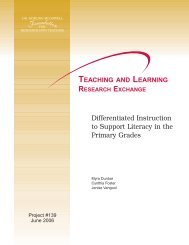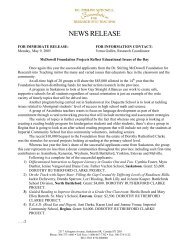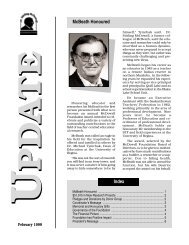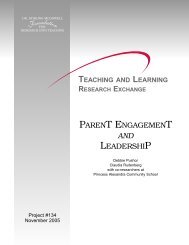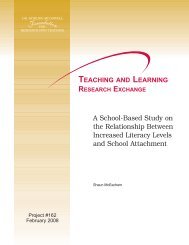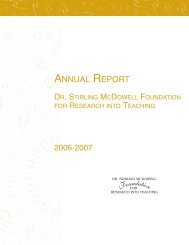Research Bulletin, Vol. 1, No. 2, 1996 - Dr. Stirling McDowell ...
Research Bulletin, Vol. 1, No. 2, 1996 - Dr. Stirling McDowell ...
Research Bulletin, Vol. 1, No. 2, 1996 - Dr. Stirling McDowell ...
You also want an ePaper? Increase the reach of your titles
YUMPU automatically turns print PDFs into web optimized ePapers that Google loves.
unrealistic expectations, andadopting a laissez-fairemanagement style. Thepositive letters viewed thoseteachers as nurturing, caring,respectful, empathetic,tolerant, and firm but realisticin their expectations.Very few of the letters dealtwith methods of instruction,but virtually all dealtwith methods of interaction.Where do we teach acourse on nurturance, oncaring, in our pre-serviceteacher education programs?Can we, or is thisbest done through extendedpracticum experiences?George Falk, <strong>McDowell</strong> Foundation researcher and SpecialEducation Coordinator, Region III, Saskatchewan EducationField experience, mentoring, the exchange of information between teachers is crucial to disseminatingthe kind of information that teachers now require. Those issues which are mostpressing in our classrooms are best addressed when research is generated and conducted by,or at least in collaboration with teachers.My interest in research grew out my need to fulfill my personal teaching mission statement,which developed from the more effective schools movement. It states: teaching is acalling, not just a job. Another version of it could be: desiring to do the right things, notjust things right. My mission asks: what are or should be my priorities in the classroom?How do I go beyond being a technician (someone who develops a repertoire of technicalskills, a methodologist) to being someone who impacts lives? Although I had developedskills in controlling student behaviour in my classroom, what continued to gnaw at mewas how the inappropriate behaviours resurfaced outside my classroom, in the schoolhallways, with other teachers, in the community, and in the student’s own home. I had theskills to do things right in my classroom so I could teach and the students could learn, butI was not doing the right things to change their lives outside my room.My quest for a better way led me to find individuals who shared my interest in expandingmy influence beyond my classroom walls. I discovered the work of <strong>Dr</strong>s. Bill Morse, BillRhodes, James Paul and Betty Epanchin, all scholars and researchers who wanted to positivelyimpact the lives of troubled children and youth for life. I began to take universityclasses, and it was while attending the University of South Florida that my love for andcommitment to research truly developed. I became part of a unit working with teacherswho had difficult classrooms, an educator on a team of researchers working in the schools.The educators on the team had approaches towards classroom challenges that were strikinglydifferent from those taken by our more psychology- and research-trained colleagues.We focused on facilitating positive resolution of a crisis, mostly by suggesting “try this,”and we weren’t interested in determining scientifically whether or not something wasworking. We just said, “It’s not working, let’s move on.” Meanwhile, the other membersLearning from Practice 27


